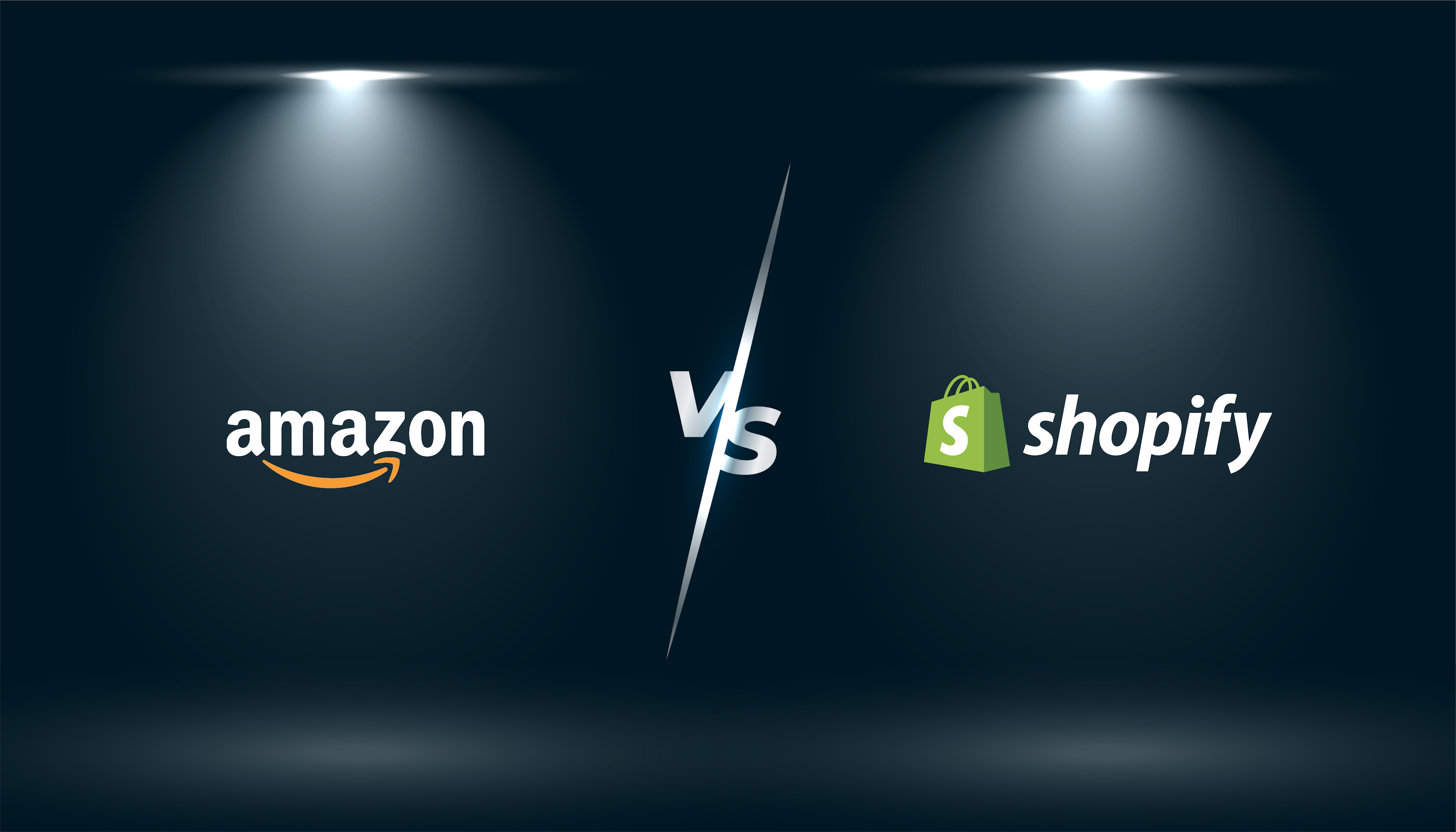
Amazon and Shopify are two of the most popular eCommerce platforms today, offering a variety of benefits for businesses looking to sell their products online.
Today we will be comparing Shopify with Amazon the marketplace. The fight between Shopify VS Amazon is bound to be highly captivating, so keep reading!
In this article, we take a look at both platforms to help you understand and possibly decide which might be the best option for your business.
About the Platforms
In this article, we take a look at both platforms to help you understand and possibly decide which might be the best option for your business. At first, I would like to shortly introduce you to both platforms.
What is Amazon?
At its core, Amazon is a marketplace – a platform where merchants can sell their products to consumers directly.
What is Shopify?
Shopify provides an all-in-one eCommerce platform that allows businesses to set up and manage their own online storefronts.
A quick comparison between Amazon and Shopify
Shopify and Amazon are high performing and reliable eCommerce platforms in their own right. However, they are very different. Let's take a look shall we?
Amazon is a highly popular online marketplace. We're sure you've heard its name countless times. Welcome to the world of professional sellers.
With over 100 million products available for sale on Amazon, the platform offers a number of powerful benefits for merchants looking to grow their businesses.
Both Amazon and Shopify allows their users or merchants to sell online. However, the way in which they do so is vastly different.
Amazon allows businesses to register with them to sell their products online. This sales process happens directly through this online marketplace. You need to register as an Amazon seller, create Amazon listings and thereby establish your professional Amazon account.
This means that online customers would go to Amazon to search for a product rather than searching for a business. So the seller has their online business on the Amazon platform itself. Online customers to Amazon will enter 'shaving gel', like for example the image below will pop out with a bunch of results. An online customer will choose one and this is how Amazon sellers start selling.
This is how online marketplaces work. They attract customers with their vast array of products, ease of use, fast comparisons to other sellers and ultimately allow customers to make an informed decision before purchasing.
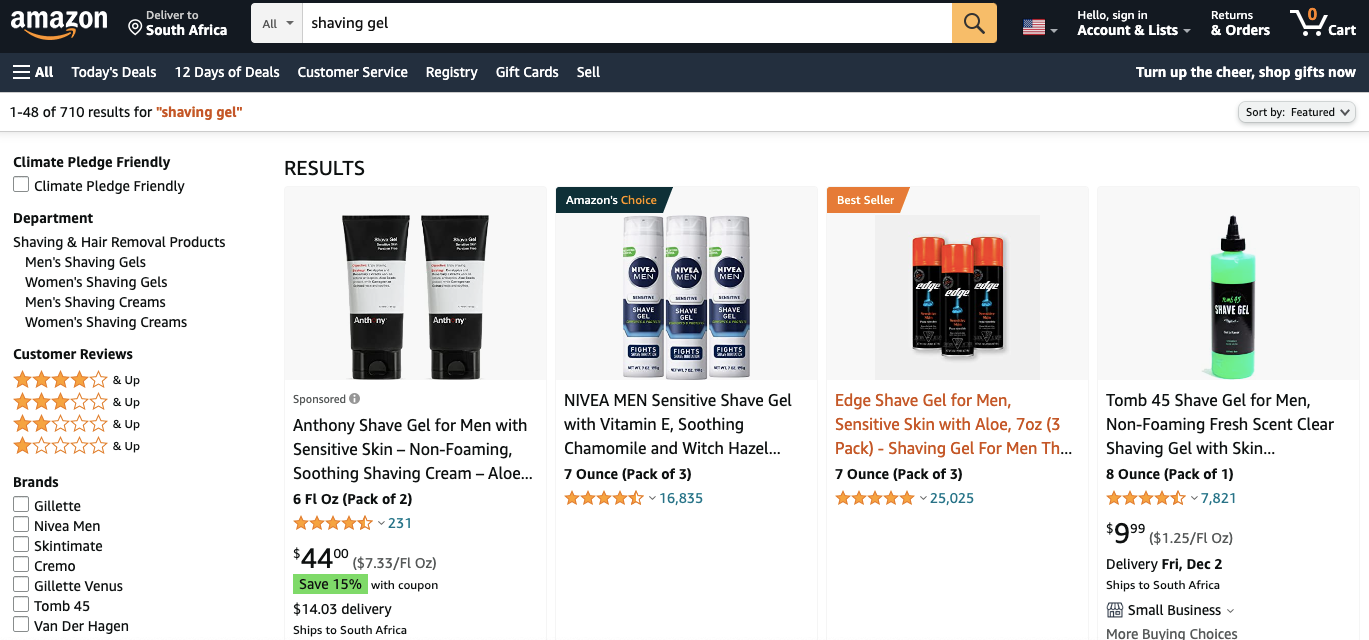
Shopify on the other hand is very different.
As we mentioned above, Shopify allows its merchants to create an online store. You can create a standalone online store using Shopify.
This eCommerce platform is an online store builder that allows its Shopify users to create their own online stores in a fast and easy manner. Online selling has never been easier!
Shopify eCommerce is not a marketplace. It gives its merchants the tools they need to make their very own website.
This platform is equipped with eCommerce tools, some key ones to mention are customizable themes, simple store management tools, built-in marketing and SEO features, 24/7 customer support and the Shopify app store.
This means that online customers will not go onto Shopify and search for your business. Instead they will use a search engine like Google, Bing, Yahoo! etc to find your businesses website. They will make purchases through your direct website and not through the Shopify platform.
It's pretty clear to see that the comparison between Amazon VS Shopify is going to be very interesting!
Price & Cost Comparison
What is the cost of selling products through Amazon?
The cost of selling products on Amazon depends on a number of factors, including the type of product you're selling, the selling price, and the Amazon fees you'll be charged.
Amazon has two 'plans'. The first comes with no monthly subscription and rather a 'per item sold' fee of $0.99.
The paid plan, that comes with a lot more flexibility and options costs $39.99 per month.
https://sell.amazon.com/pricing#selling-plans
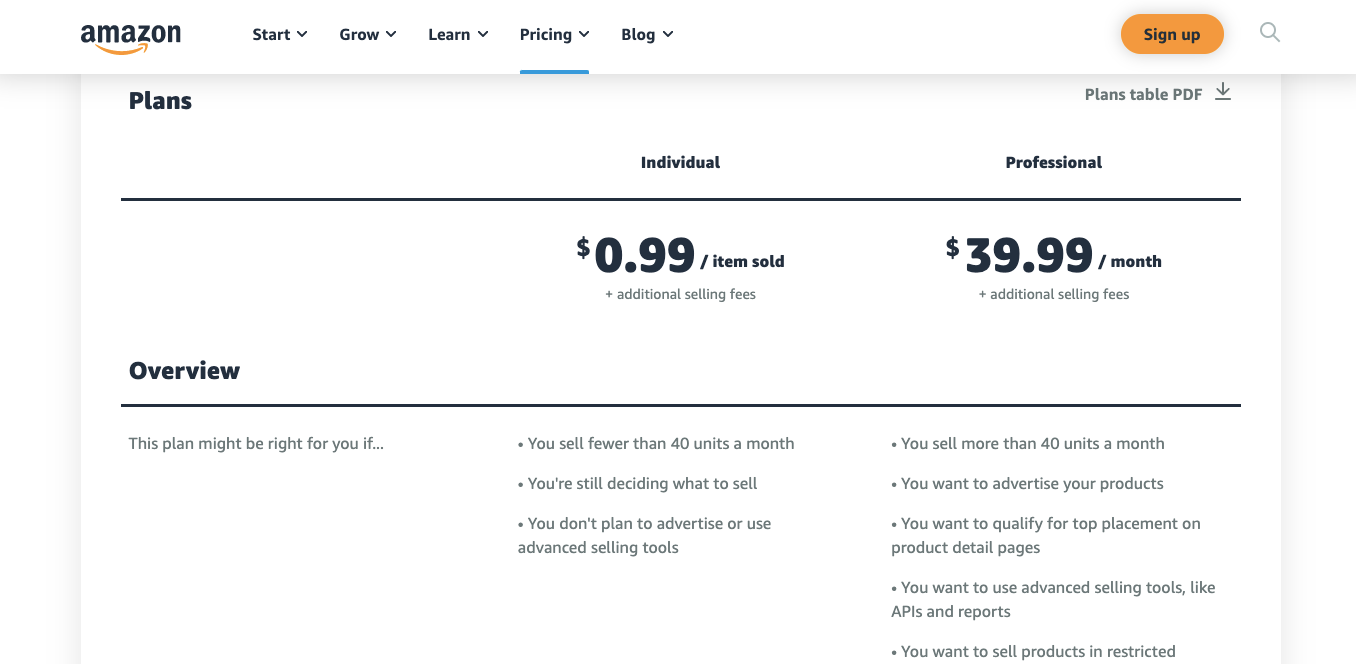
Furthermore, Amazon charges two types of fees: a referral fee and Amazon FBA fulfillment fees.
The referral fee is a percentage of the total sale price that Amazon charges for each product, this is usually between 8% and 15%.
Amazon has this clearly marked out, you can take a look at the extensive explanation below.
https://sell.amazon.com/pricing#referral-fees
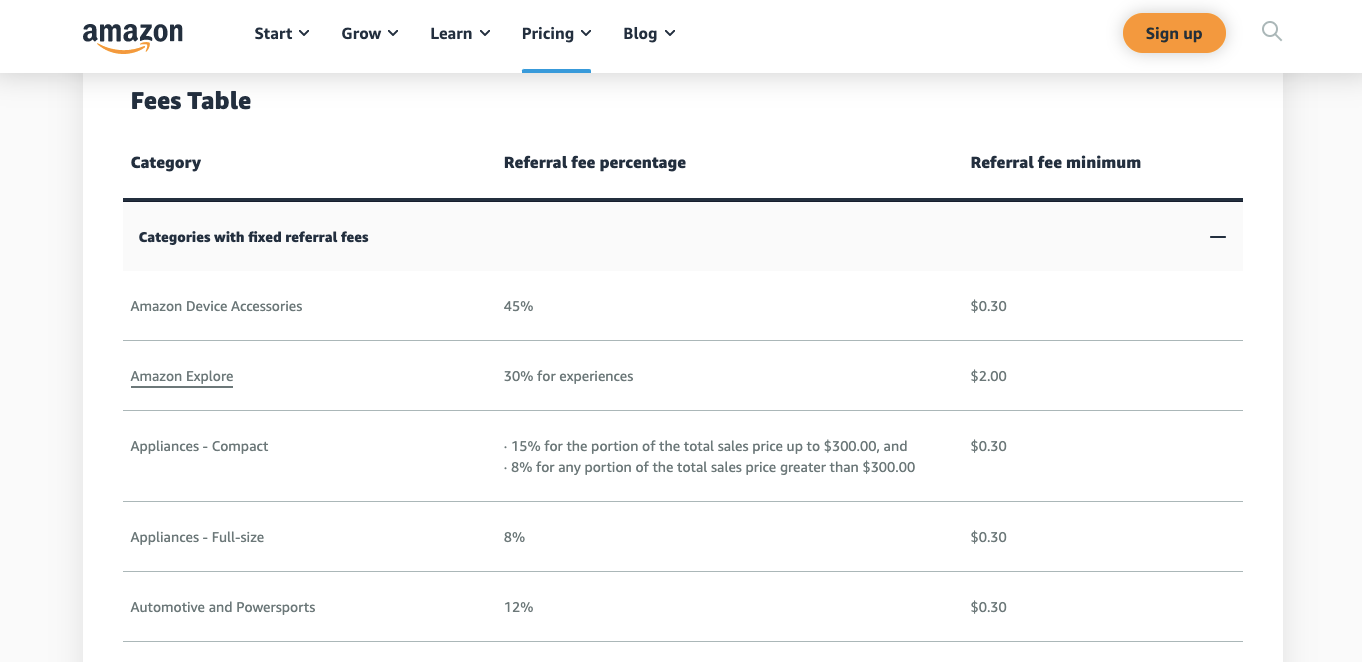
While the FBA fulfillment fee is for shipping and handling on behalf of Amazon. The fee is based on the weight of your product and means that Amazon will take care of the packaging and shipping of your item. The shipping fees can feel high but they also take a big responsibility off the store owner when Amazon handles this stage on behalf of the business.
https://sell.amazon.com/pricing#fulfillment-fees
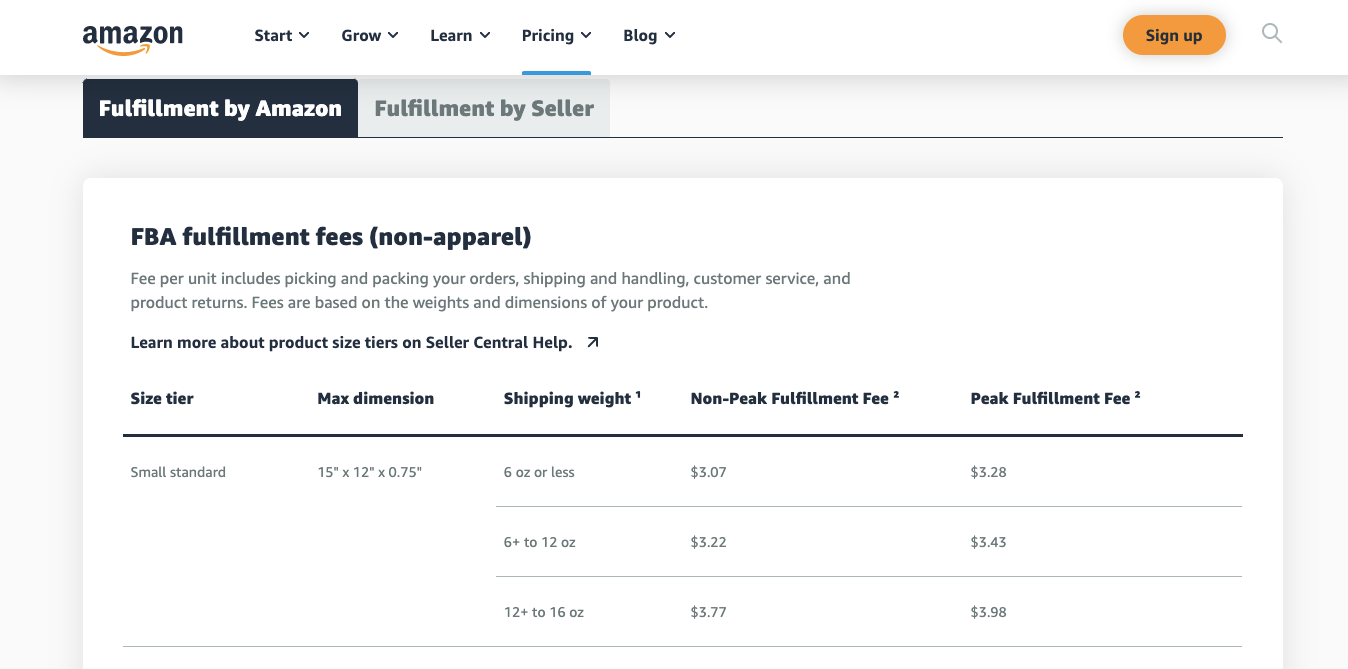
For more information on Amazon's fees and pricing structure, please visit their fees and pricing page: https://sell.amazon.com/pricing
What is the cost of your own online store with Shopify?
Shopify offers a range of pricing plans to suit businesses of all sizes. Their most popular plan is the Basic plan, which starts at $29 per month and includes a number of features such as Shopify's basic eCommerce features, unlimited storage, and a free custom domain name.
For businesses that need more features or want to sell more products, Shopify also offers a number of premium plans, including the $79 per month for the Shopify plan and the $299 per month for the Advanced Shopify plan. These plans include additional features such as advanced reporting tools, inventory management, and customer support.
Shopify plans either come at a monthly fee or a yearly fee, it's up to you to choose. A monthly subscription is generally slightly more expensive than the yearly plan.
A Shopify store comes with five different plans, we have outlined them easily for you to see clearly here:
- Shopify Starter – $5 per month
- Basic Shopify – $19 per month (with a deal running now for $1 for the first three months!)
- Shopify – $49 per month
- Advanced Shopify – $299 per month
- Shopify Plus – starts at $2000 per month
Should you wish to know more about Shopify plans and pricing, please feel free to take a look at our lengthier explanation of the topic here.
Althernatively or additionally, you can also find more information on Shopify's pricing plans and features on their pricing page:
https://www.shopify.com/pricing
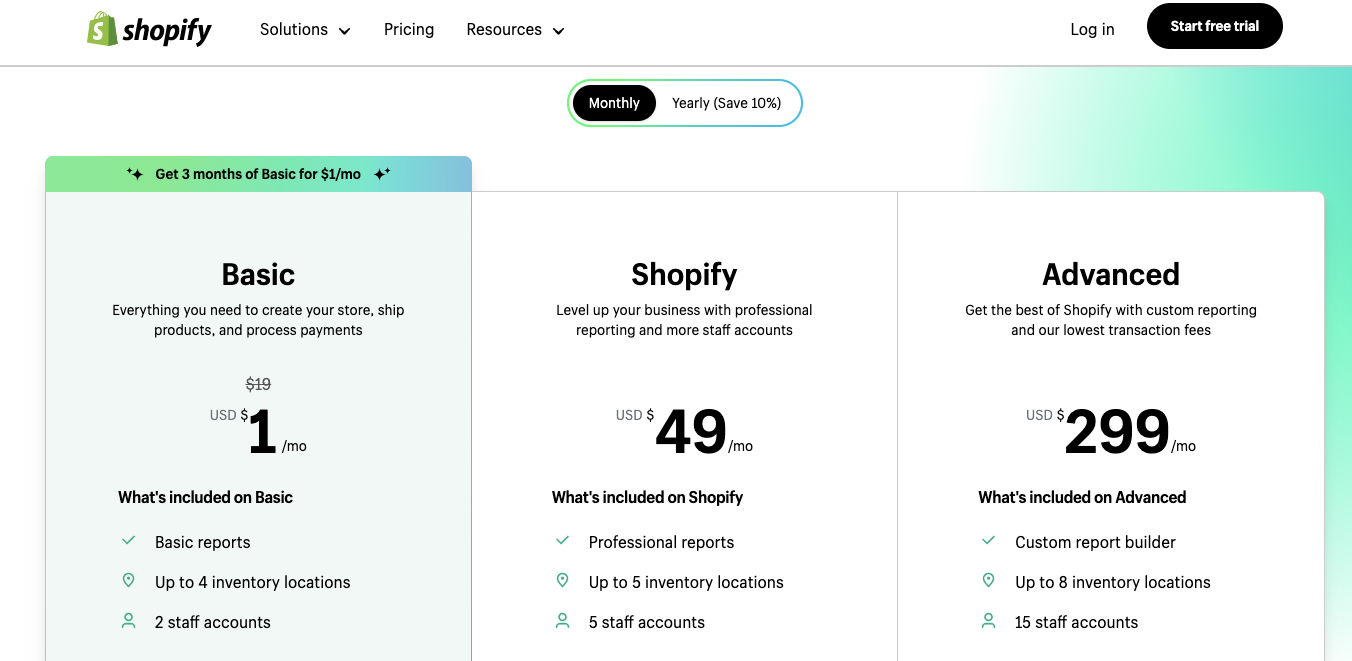
With Shopify, you will also pay for other things when you set up and run your store.
When you start your own store with Shopify, you will have to select a Shopify design (a so-called “theme”). There are free and paid themes, with the paid options usually offering more design options and features.
Many Shopify store owners use third-party apps to enhance their shops' functionality even more. These apps typically have their own monthly subscription fee that gets added to your monthly bill.
It's hard to predict where you will end up when adding up investment cost, transaction fees and app subscriptions.
Finishing thoughts on the price comparison
In terms of cost, it's hard to pit Amazon VS Shopify against each other, as each one is a specialized eCommerce platform with a largely different business model and hence very different selling fees.
To sum it up, when pitting Shopify vs Amazon in terms of cost, you will usually have a small up front investment and a higher overall referral fee on Amazon, while Shopify will come with a larger investment to set up your store, yet lower transaction fees.
Shopify and Amazon each cost a certain amount, as an online store owner, it is up to you to decide which pricing structure suits your business best.
Why choose Amazon and how to get started with it
Benefits of selling with Amazon
Some of the key benefits of selling with Amazon include:
- A massive and ever-growing customer base
- The ability to reach a large number of buyers around the world
- Easy product listing and order management
- Powerful marketing and SEO tools
- A selection of customizable templates and themes
- 24/7 customer support
- Fast and secure payments
- High levels of security, trust, and reliability
- The reputation of an established online marketplace and fast service of Amazon
How to set up an Amazon seller account
If you're looking to start selling products through Amazon, here are a few steps to get you started:
1. Go to Amazon.com and click "Sell Your Stuff" in the top navigation bar.
2. Click on the "Start Selling" button.
3. Fill out the required information and click "Create Account".
4. Verify your account by clicking on the link in the email Amazon sends you.
5. Enter your bank account information and tax information.
6. Review Amazon's Seller Agreement and click "I Agree".
7. Start listing your products on Amazon!
Why to choose Shopify and how to get started with it
Benefits of an online store with Shopify
Some of the key features offered by Shopify include:
- Easy set up of your own eCommerce website with simple to use drag and drop functions
- A wide selection of customizable themes. Free templates or paid templates are available on the Shopify Theme store page.
- Simple store management tools
- Built-in marketing and search engine optimization features, abandoned cart recovery and adding useful discount codes
- The ability to easily scale up your business as needed
- High levels of security, trust, and reliability
- Fast and secure payments. Many payment options are accepted, and the transaction fees change depending on which Shopify plan you go for.
- Shopify's very own service provider, Shopify Payments, which charges 0% transaction fees
- Easy product listing and order management
- Reliable 24/7 customer support
- The ability to reach a large number of buyers around the world
How to set up your Shopify store
If you're looking to start selling products through Shopify, here are a few steps to get you started:
1. Go to Shopify.com and click "Start a Free Trial" in the top navigation bar.
2. Fill out the required information and click "Create Account".
3. Verify your account by clicking on the link in the email Shopify sends you.
4. Enter your bank account information and tax information.
5. Review Shopify's Terms of Service and click "I Agree".
6. Start listing your products on Shopify! It's that easy to have a Shopify account.
Additional Points of Comparison
Do you need coding knowledge to sell your products on Amazon?
No, you do not need coding knowledge to sell a product on Amazon. Amazon offers a wide range of support options for businesses that sell products through its marketplace, including a comprehensive set of documentation and help resources, email and phone support, and training courses.
Do you need coding knowledge to create a store with Shopify?
No, you do not need coding knowledge to create a store with Shopify. Shopify is a web-based platform, which means you can create and manage your store from any computer or device with an internet connection.
What marketing tools does Amazon offer Amazon sellers who use their platform?
Amazon offers a wide range of support options for businesses that sell products through its marketplace, including a comprehensive set of documentation and help resources, email and phone support, and training courses to equip their users for online sales.
With Amazon, your customer base will find your products through the Amazon marketplace. Therefore, you need to rank highly on Amazon SEO by optimizing your product information content and search terms.
With your Amazon seller account, you gain access to Amazon DSP which allows you to buy display, video, and audio ads both on and off Amazon. Another nifty one is Amazon Live, which allows you to stream live videos that are interactive across Amazon.
What marketing tools does Shopify offer merchants who sign up with them?
Shopify offers a wide range of powerful marketing tools to help businesses grow and succeed online.
These tools include built-in marketing and SEO features, an extensive app store, social media integrations, and more.
For businesses that sell products through Shopify, these tools can be incredibly valuable in helping increase traffic and sales to their stores.
What support does Amazon offer the businesses it hosts?
Amazon offers a wide range of support options for businesses that sell products through its marketplace. This includes a comprehensive set of documentation and help resources, as well as email and phone support.
Some of the key support resources offered by Amazon include:
- A Help Center with articles and tutorials on using Amazon's marketplace, listing products, processing payments, and more
- Discussion Forum where businesses can post questions and get help from other Amazon users
- Email Support where merchants can contact Amazon customer service with questions or problems
- Phone Support where merchants can speak to an Amazon representative directly about their account or order
Amazon also offers a number of training courses for businesses looking to learn how to use the platform more effectively. There are plenty of video tutorials on YouTube that assist in setting up like: How to sell on Amazon for beginners (step-by-step tutorial).
These courses are free to join and cover a range of topics such as setting up your seller account, listing products, processing payments, and more.
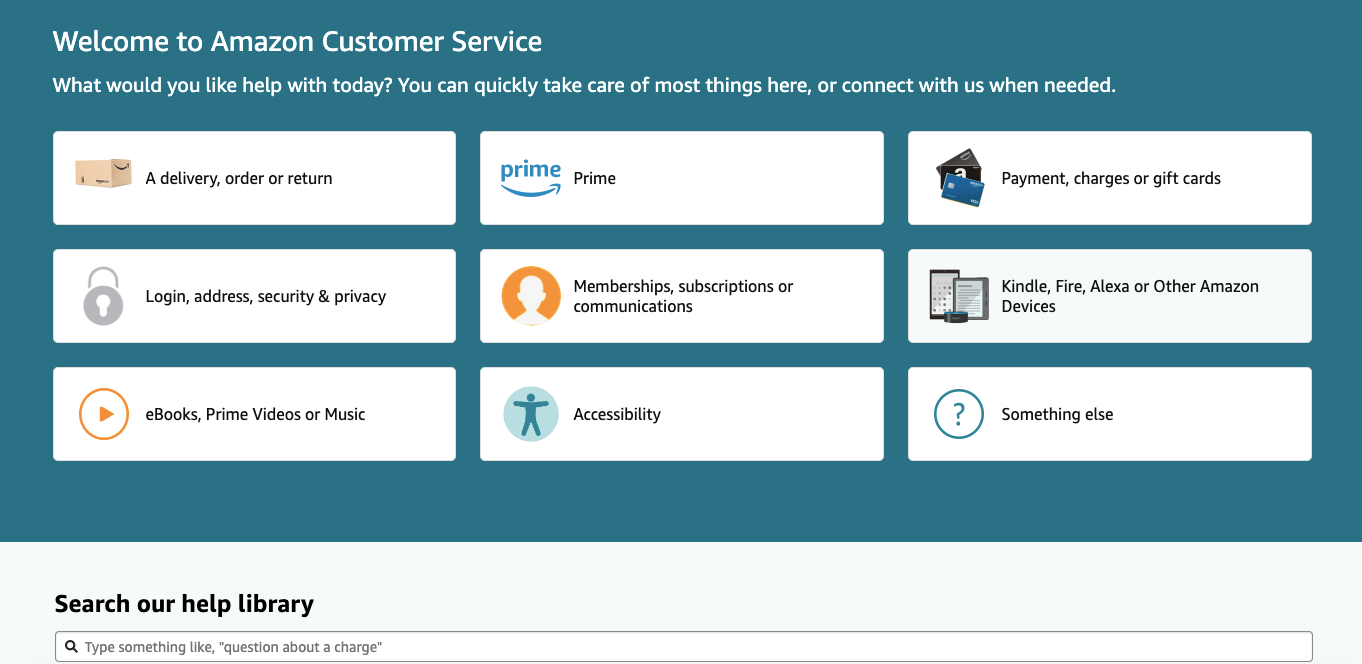
What support does Shopify offer its merchants?
Shopify offers a wide range of support options for businesses that sell products through its platform, including a comprehensive set of documentation and help resources, email and phone support, and training courses.
Shopify makes it easy to find the answers you're after by sub-diving their enquiry topics as seen below.
https://help.shopify.com/en/support/topic-select
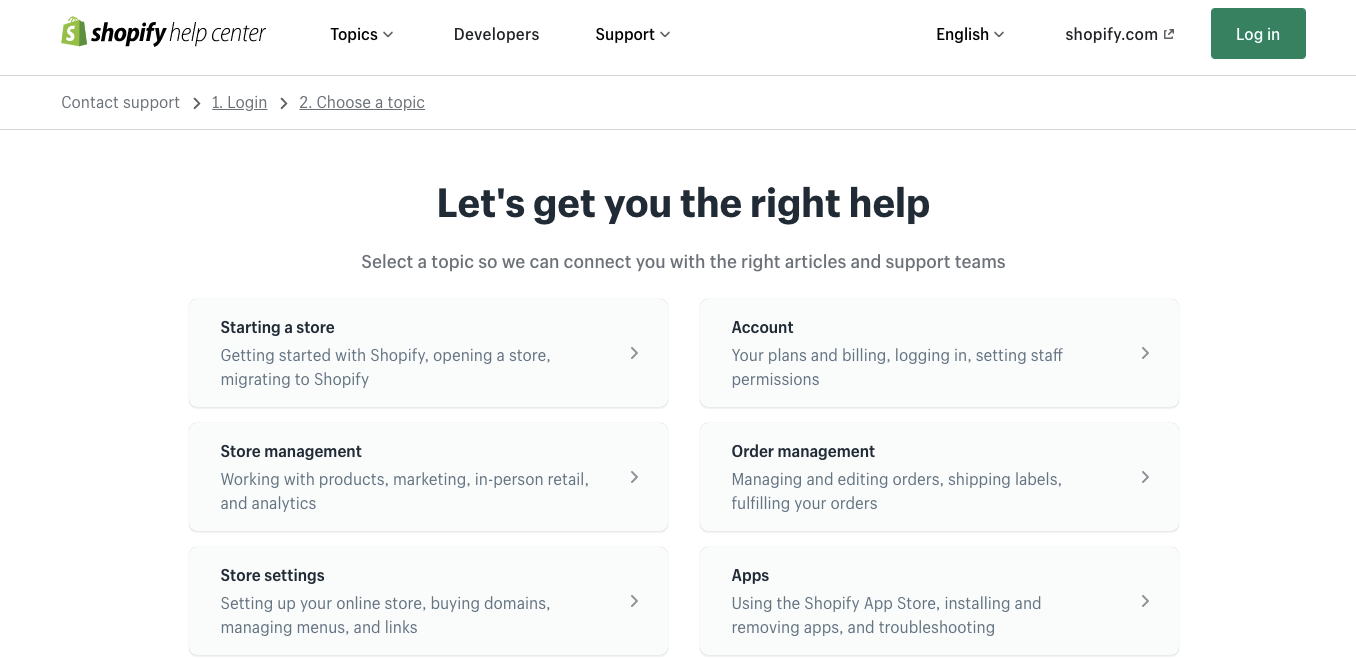
If you are an Amazon seller and want a Shopify store, then listen up...
Can Amazon be integrated into Shopify?
This is a comparison article, so of course we are going to hold Shopify vs Amazon and try to talk about the differences. Yet, a balanced e-commerce approach leads many companies to make use of more than one sales channel. This “multichannel approach” usually ends in a situation, where you want to connect your ecommerce website with other channels like Amazon.
And yes, Amazon can be integrated into Shopify. There are a number of different integration options available, which allow businesses to sync their Amazon and Shopify stores, manage orders and inventory between the two platforms, and more.
So, it's completely possible to have your new online store on your own domain and integrate Amazon to your eCommerce business.
Conclusion
Shopify VS Amazon
Whether you're just getting started with eCommerce or looking to expand your business online, Amazon and Shopify are two top platforms that can help you achieve your goals.
Which platform is right for you will depend on your specific needs and business goals – so be sure to do your research before choosing the best option for your business.
The eCommerce world can be overwhelming and daunting, but fret not, simply read through comparisons on Shopify and Amazon if you're unsure.
Online sellers on Amazon are supported by the Amazon platform and are able to be seen by Amazon's large customer base. This means you have to put less effort into marketing, yet you pay transaction fees that are significantly higher than on Shopify.
Online sellers on Shopify have to find their own customers, but they have their own online store and can set their tone of brand straight a lot easier.
It's not an easy decision to make, as you saw above, both Shopify and Amazon have some great pro's, but they also have some con's, so it is up to your business needs.
Get in touch with us if you're looking to have a Shopify store, we'd be happy to help you. Email us on hello@especial.digital or contact us here on our website.
Found this helpful? Share this post with your colleagues and friends

Natalie Miller
Marketing ManagerCONTACT
Would you like to know more?
Let us help you!

Don't want to miss anything?
Subscribe to the Especial Newsletter now and stay up to date with all our exciting ecommerce news!